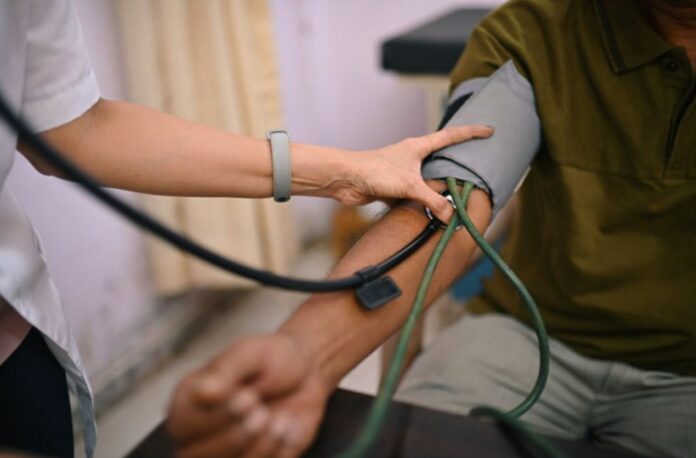Middle-aged people with high blood pressure who have been unable to reduce their blood pressure through conventional methods such as reducing salt intake, weight loss, and medications now have a new way to manage their condition, thanks to the latest addition by experts in the field.
A new study headed by researchers from Columbia University and the Université de Paris, France, demonstrated that a device that uses ultrasound to relax hyperactive neurons in the kidneys consistently lowered the daytime ambulatory blood pressure of middle-aged hypertensive patients by an average of 8.5 points.
In order to reduce blood pressure in people with hypertension, doctors often recommend lifestyle modifications like cutting down on salt consumption or dropping weight, as well as drugs. Even with these treatments, about one-third of people with high blood pressure still can’t control it.
“Many patients in our clinical practice are just like the patients in our study, with uncontrolled blood pressure in the 150s despite some efforts,” remarks co-lead author Ajay Kirtane.
Long-term uncontrolled blood pressure may result in heart failure, strokes, heart attacks, and permanent kidney damage.
“Renal ultrasound,” as explained by the author, “could be offered to patients who are unable to get their blood pressure under control after trying lifestyle changes and drug therapy, before these events occur.”
The research, the findings of which were reported in JAMA Cardiology, evaluated the device used in the outpatient surgery known as ultrasonography renal denervation. The FDA has not yet granted permission for the use of the device outside of clinical trials; it is currently under study.
kidney nerves and high blood pressure
It is believed that hyperactive renal nerves, which induce water and salt retention and produce hormones that may elevate blood pressure, are a contributing factor in the development of hypertension in middle age. (Hypertension often develops in elderly individuals when blood vessels tighten.) Antihypertensive medications reduce blood pressure in a variety of methods, such as via dilation of blood vessels, removal of extra fluid, or blockage of hormones that elevate blood pressure. Yet, none of these drugs specifically target the renal nerves.
By calming hyperactive nerves in the renal artery, ultrasound treatment blocks the impulses that cause hypertension. A thin catheter that is placed into a vein in the wrist or leg and sent to the kidney delivers the treatment to the nerves.
Study findings
Data from three randomized studies involving more than 500 middle-aged individuals with various levels of hypertension and medication usage were combined in the new research.
Compared to patients in the sham groups, twice as many patients who got the ultrasound treatment achieved their goal daytime blood pressure (less than 135/85 mmHg).
The outcome was almost the same in all of the trial groups, proving conclusively that the device may drop “blood pressure in a broad range of patients,” according to Kirtane.
There were no serious adverse effects from the treatment, and the vast majority of patients were able to go home the same day. Kirtane claims that changes in blood pressure might be seen as soon as one month after the treatment.
The FDA will assess the therapy in the following months.
Conclusion for resistant hypertensives
The treatment might potentially be given to individuals with uncontrolled hypertension as an addition to drug therapy and lifestyle modifications, according to the researchers.
“Once the device is available,” Kirtane adds, “we envision recommending it to patients who have tried other therapies first. The hope is that by controlling blood pressure, we might be able to prevent kidney damage and other effects of uncontrolled blood pressure.”
Source: 10.1001/jamacardio.2023.0338
Image Credit: Getty
